#him having suffered does not absolve him from his sins
Text

Before any asks come in, I figured I'd do some for my current crowning hyperfixation, which is the boys. Did one for each of their initials but Dick got two because I couldn't choose <3
Warnings: 18+ MDNI! , gen soft yandere behavior, murder, kidnapping, dacryphilia, sadism/masochism
D = Darling (Beyond Morality, is Any Act Justified in Their Pursuit of Their Darling? Is Consent Merely an Obstacle to Be Overcome?):
Dick: Dick is the most moral of the yandere batfam, and considers doing the right thing very important. Of course, you’re still much, much more important but… He’ll definitely start small. He’s manipulative. Always begging and pleading for a little more of your time, whining when you don’t give it. And he does it openly, too, not even trying to hide it. Maybe that will absolve him of some of his sins, he thinks a little pathetically. Things like murder and other crimes are harder for him to get into, as he’s quite loyal to Bruce’s code. And he probably wouldn’t kidnap you, just move into your house instead, then your bedroom, then under the covers and with your arms around you. Very slowly, so he doesn’t scare you away. And as someone who has experienced s/a before, he wouldn’t do that to you. No matter how desperate, no matter how many nights he spends taking a suspiciously long time in the shower, he’d never do that to you. In the end, he just wants you to be happy so… so the other stuff doesn’t need to matter as much.
Damian: Damian has a very black and white form of thinking. It took Bruce a hell of a lot of work to change that, and with the advent of you in his life, he swings right back to that black and white. Morality is thrown right out the window when it comes to getting you, to getting you to love him. Murder? He’s done it before. Kidnapping? He’ll keep you safe with him. He’s a romantic, though (like they all are) and he wants you to love him back. He’s irritated that he can’t force that, that if he broke you, you wouldn’t be you. So in the end he won’t ever do anything too far, nothing that would truly get in the way of his goal. Still, with the kidnapping thing, you guys are just going to get stuck together for a while, because he’s certainly not letting you go. The two of you are just gonna have to suffer together till you inevitable fall in love with him. Don’t worry, he’s got a plan!
J = Jealousy (Does Jealousy Course Through Their Veins, Leading to Possessive Outbursts and a Relentless Need to Eliminate Perceived Threats?):
Jason: Jason is so unbelievably jealous it sometimes physically hurts. Like he’s being burned alive by it, which, well, he knows what that’s like so he can say it with confidence. He finds your presence calming, usually, but that first time he sees you laughing at a close friend’s joke, he realises you bring out every emotion in him. This time, fiery rage from the literal pits’ of hell. He won’t ever hurt you (and if he ever thinks of it, even for just a moment, the pure horror is enough of a cool bucket of icy water over his head to snap him out of it) but others? Oh, oh no. He left that silly ‘no killing’ code behind a long time ago, and he’s very glad for that as he beats one of your admirers into the concrete. And if you have other yanderes under your thrall? You’ll find yourself constantly breaking up fights, and maybe one day, cleaning up a body. Even then, Jason doesn’t like seeing you touch them, so he does it for you instead. What a sweet guy, eh?
R = Regret (Would Guilt Ever Be a Foreign Emotion, Overridden by the Conviction That Their Actions Are Justified? Is the Idea of Letting Their Darling Go Inconceivable?):
Richard/Dick: Constantly. Dick is constantly suffering under the weight of his choices, the way he’s treated you, the things he thinks about you. And even as he does it again, does worse, he’ll still have that bit of guilt in the back of his mind. He wants to stay with you, to fucking climb inside your rib cage and live next to the comforting sound of your beating heart, but he knows that’s all unhealthy. He sometimes can’t banish the guilt from his head, sometimes it’s overwhelming, and those are the moments he’ll back off a bit.
T = Tears (Does the Sight of Their Darling's Suffering Evoke a Twisted Pleasure, a Morbid Satisfaction Reinforcing Their Control?):
Tim (Going to play around with this one a bit, if you’ll forgive me): Tim is purely fascinated by you. He’s one of the yanderes who gets obsessed with you first, and falls for you second. Your tears, just simply by being a byproduct of you are fascinating to him too. And yeah, they turn him on. Everything about you turns him on, but the sight of your weepy face, has his cock weepy too. As a sadomasochist switch, he likes it when you’re suffering just a little bit. It’s just too cute to resist. But on the other side… he likes when you make him cry too. He likes when you hurt him, as long as you’re paying him attention, looking at him. He’ll cry all you like, if you think it makes him cute, too.
#Event:1kCelebration#yandere batfam#batfam x reader#yandere dc#yandere batfamily#yandere x reader#dick grayson x reader#nightwing x reader#jason todd x reader#red hood x reader#tim drake x reader#red robin x reader#damian wayne x reader#robin x reader
347 notes
·
View notes
Text
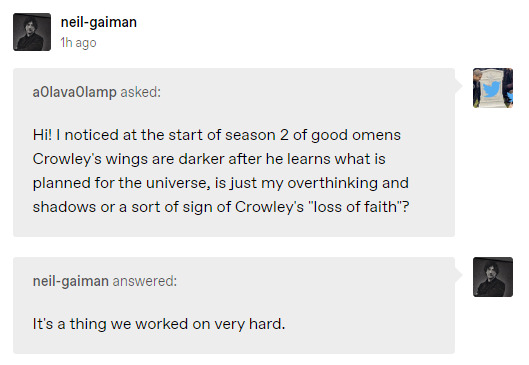
So, this response really got me thinking again and turning around some different gears in my head. Crowley's fall started with their meeting. That's huge!
This means Aziraphale caused Crowley to fall, at least indirectly and Aziraphale knows it.
I do quickly want to say that I feel it's likely Crowley would have fallen anyway, that it would have happened because of his nature and his curiosity and his questioning, but Aziraphale must remember that first meeting and blame himself for the eventual outcome. Here was this wonderful, joyful angel out there making nebulas and Aziraphale talked to him for like five minutes and he fell.
Because of Aziraphale.
It also recontextualizes some of Aziraphale's other actions if you think about the Guilt that Aziraphale must have been feeling. He's clearly smitten with Crowley when they first meet while Crowley's an angel, but on the wall at Eden, he's definitely more uncomfortable and his gazes aren't the longing looks from pre-creation. He recognizes Crowley as that angel, he feels guilty about it, far more than he does about giving away the flaming sword. And then when it starts to rain, he protects Crowley because it's the least he can do after what he did to ruin Crowley's life.
I'm betting he felt that same guilt very heavily when Crowley asks him for the Holy Water initially. He's afraid that Hell is so bad that Crowley would destroy himself to escape it. And though Aziraphale has clearly pushed his guilt mostly to the back of his mind, it has to be there in the forefront at that moment.
He's thinking "Crowley is suffering so much he'd rather be destroyed". He's remembering that beautiful, innocent angel Crowley was and how his laughter lit up the stars themselves and now Crowley asks him for the ability to end his existence. No wonder Aziraphale is so reluctant! If Crowley uses the Holy Water on himself, it means Aziraphale will be responsible for Crowley being completely destroyed. He only caves on the matter when he realizes Crowley will do it without his help and realizes he can't make Crowley suffer more to get it, not after everything he's already done to the demon so far.
I've always wondered why Aziraphale seems afraid of Crowley loving him. He's always seemed comfortable in the knowledge that he loves Crowley, but when Crowley tries to confess to him in the S2 finale, he looks terrified. He looks like he's about to have an anxiety attack.
It's not because he doesn't want to be loved by Crowley. He wants that more than anything. It's because this is the /wrong time/. But it was - in Aziraphale's head - so close to being the right time. In Aziraphale's mind, he was so close to finally making up for this horrible thing he did to Crowley, that he could finally accept Crowley's love without this looming over him. It's not just about making Heaven worthy of Crowley, it's about making HIMSELF worthy of Crowley's love.
What Aziraphale doesn't realize is that Crowley has never blamed him. Never. He's just projecting his own guilt and then using it to bludgeon himself into thinking he's not good enough for Crowley. Aziraphale values Crowley more than he values himself, just like he trusts Crowley more than he trusts himself.
It makes me think a bit more on the concept of Grace in Catholicism, how sins must be cleansed to allow the Grace to flow through and fill the body. When you believe that you must be cleansed of sin to accept Grace, it's an easy jump to feel that you cannot also be worthy of love if you have not absolved yourself of sin. But in Aziraphale's mind, there is no way to fix what he did to Crowley. Until there is.
No wonder Aziraphale reacts so excitedly - and so desperately - to the thought of reinstating Crowley as an angel. Yes, he knows Crowley is more than worthy of being an angel, that he never SHOULD have fallen to begin with. But with this added context it's even worse… he blames himself for Crowley falling. Crowley was so happy as an angel and Aziraphale took that away from him. He sees reinstating Crowley both as the Right Thing to Do in a moral sense, but also as a way to finally absolve himself of this guilt he's undoubtedly carried since Crowley Fell.
Aziraphale is so blinded by his guilt and his need to absolve himself and make it right for Crowley that he completely fails to realize both that Crowley doesn't want what he's offering, but he also fails to realize that Crowley doesn't even blame him for the terrible thing he thinks he did. Crowley already loves him without condition.
Trying to make Crowley an angel again is the most tragically selfish, self-centered thing Aziraphale has ever done and even then it comes from a trauma he's been carrying since before the Beginning.
He keeps forgiving Crowley for things that don't need forgiveness, but what Aziraphale really needs - for both of their sakes - is to finally forgive himself.
97 notes
·
View notes
Text
The thing is that Dean and his abandonment issues wants Castiel to stay, despite the fuck ups and the blame and the anger, he needs him to stay as proof that he’s not toxic that he can have good things and not break them
But Castiel, and his guilt chose to leave because that is his penance. Why does he deserve to be happy when he has caused so much suffering? How can he look at Dean smile at him when he’s fucked up so much? He needs to leave because how could he be around Dean like he isn’t a living monument to all the ways his fuck ups hurt the ones he loves.
Cas wants to help the brothers, so he leaves. He’s caused them so much pain what right does he have to be around them, when he can be out there getting them information, finding things they need, helping fix their problems. This is his penance. Because no matter how hard he rebelled or how far he fell Castiel has an innate, almost primal need to be holy, to be absolved of his mistakes and sins. And he’s made so many mistakes where else can he find penance but in misery?
And in almost every episode Dean is in some way or form asking Castiel if he'll stay this time, and every-time Cas says no. And Dean can be mean, he’s s a deeply angry man, and so every no seems like proof that he’s pushed him to far that this is it this is when Cas says he's had enough. He's not gonna stay and be screamed or laughed at anymore. Dean’s finally succeeded in driving him away as he does anyone that’s ever given a damn about him. That this is proof of how toxic he is; after all Castiel is a creature with wings, all he wants to do is fly, and here Dean is trying to keep him in a cage.
The more Cas leaves on his own, the more Dean feels the need to give him a reason too.
The ways in which we punish ourselves; depriving ourselves of the ways in which we love.
The narrative’s doomed them from the start.
#throwing thoughts to the void#the narrative is not on your side but on the side of the story.#it will always do what is most interesting#Chuck’s not evil he’s just bored.#I swear I was only going to write a sentence then an essay came out#destiel#dean winchester#castiel#dean x castiel#supernatural doesn’t so much have good ideas as it trips and stumbles into the occasional earth shattering concept.#supernatural#spn#deancas#honestly Cas has a lot to feel guilty about isn’t he like atleast half the reason his species is almost extinct?#no wonder the angels hate him I’d hate him too
49 notes
·
View notes
Text
Trials and Denials
Part 2 of The Passion of Jimbriel
Part 1: The Entry to Soho is here
The story of events leading up to the crucifixion of Jesus, and the days following, until his ascension to Heaven, are collectively known as the Passion narratives. It comes from the Latin "to suffer," or "to endure."
More than one op has mentioned there are parallels to this in S2, so I thought I would try and find how well the whole narrative was followed. Oh yes, is the short answer, it certainly does! And how! And in places you might be surprised about. I hope this series of metas might answer some of the odd mysteries of "why is that there...? that are still floating around at the moment for you.
In Part 1 we looked at the three temptations in the wilderness during the 40 days of fasting, before the entry to Jerusalem on donkey. Then there was the Cleansing of the Temple and the Anointing of Jesus.
Now we start to do some hard work. As a warning, we are going to be covering part of the Final Fifteen Minutes during this post, so if you don't want to read this at work, or somewhere else you don't have privacy to be upset, you might want to save or skip this for later.
I also mentioned at the end of Part 1 that it's not just Jim/Gabriel that takes on the role of Jesus, it's also Crowley - and they change around as we follow the narratives along. Crowley and Gabriel actually have a lot in common so it shouldn't be that much of a surprise.
The Last Supper is the next way point we need to cover in the narratives as we move along. It was at the Eldritch Ball, of course, with Jimbriel offering everyone "tiny little dinners" and just about everyone had a drink in their hand.
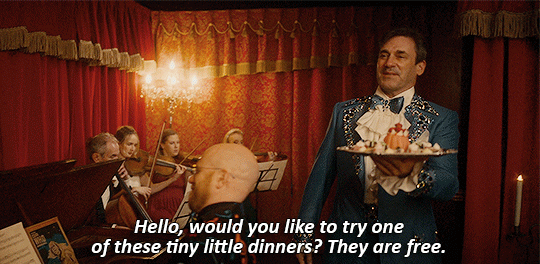
And he does share something he discovered about his body with the assembled crowd.

The Denial of Peter. After the meal, on the way to the Garden of Gethsemane, Jesus predicts that Peter, the first Apostle, would deny him three times before the cock crowed (or morning arrives.) In the narratives this happens in quick succession, but in S2 the three incidents are spread out.
But who plays who? Here's the prediction:
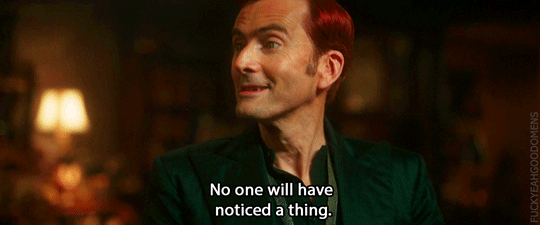
And here's Peter Michael, who's going to do the denying.

The Agony in the Garden of Gesthsemane is the next main part of the narratives. Here Jesus has retreated with three of the Apostles after the meal to pray and to ask to be released of his burden. But after pleading three times, he accepted he must take on the sins of men and die for them.
We have actually mentioned this one before - It is Crowley drinking the laudanum in the 1827 minisode. By drinking the laudanum in Elspeth's place he absolves her of her intended sin of taking her own life and took it upon himself - he saved her from going to Hell, so she could join wee Morag in Heaven, eventually (and paid the price in her place for it.) I covered it in my Altar of Eccles Cakes as it also covers being a Sin offering. It was first suggested here.
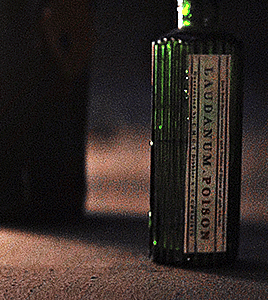
"If this cup cannot pass by, but I must drink it, Your will be done!" Matthew 26:42
An angel was said to have come from Heaven to comfort and strengthen him. Uh huh.

Jesus then comes back to find the three Apostles asleep. "The spirit is willing, but the flesh is weak."
I'm going to suggest these could be the three bodies we see in the 1827 minisode: the first is the body dressed in the mason's apron that Elspeth has dug up when Aziraphale and Crowley first come upon her, the second is the priest they dig up with wee Morag along, and the third is wee Morag's body. Why? Because I've been thinking about being shown the mason there in contrast to the priest (and the mention of masons in other parts of S2) and the brief discussion that is had about where one goes after one dies in that minisode. And the thing is, as Aziraphale tries to point out (and Crowley tries to argue with Aziraphale, as well) a lot of what you believe in while living doesn't matter once you die. Masons just have to believe in a supreme being (i.e. the Almighty) but they don't have the same belief structure as the Christian church. Both the mason and a catholic are going to end up in the same place (and wee Morag, too) despite that.
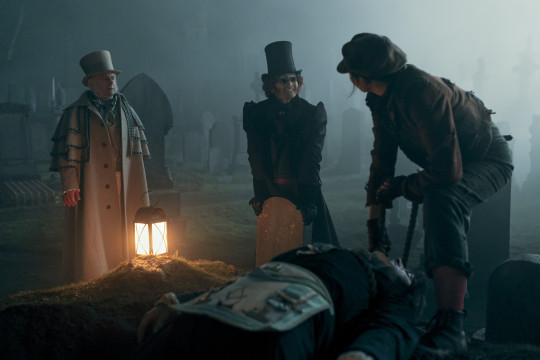
Now we've reach The Kiss of Judas, then The Arrest. But lets take a couple of steps back and set up the betrayal of Judas first - which starts around here:
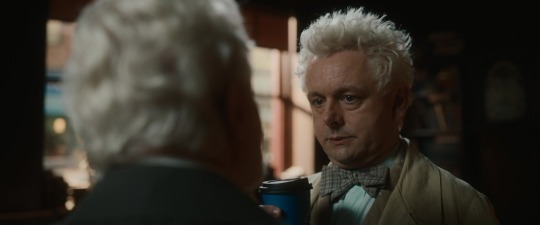
Hello there, Judas!Aziraphale. Aren't you going to accept my 30 pieces of silver bribe in the form of I'm-watching-what-you-do-almond-syrup-laden-coffee? Come and have a further chinwag with me while I bribe you with more silver in the form of the the Supreme Archangel's clothing and status! Meanwhile I'll just glare at this troublemaker of a Jesus!Crowley-echo-from-the-Great-War-in-the-past to remind him I haven't forgotten about him.
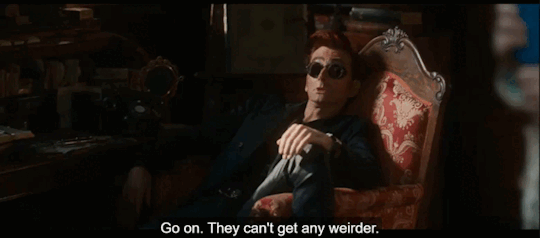
That's the Metatron, standing in for the High Priest of Israel, Caiaphas. We'll be seeing him again.
Oh. Yeah. The Kiss of Judas, to identify Jesus to the soldiers who came to arrest him.

You might notice it was kind of swapped around, though - Jesus was the active kisser in this instance.
So now we get to ask why. Why this. Why this ending. Because the relationship between Judas and Jesus is crucial to understanding what went on and what decisions were made. If the majority of us don't even understand that story we may have been told over and over again, how are we going to understand this one? No wonder we've been struggling with it.
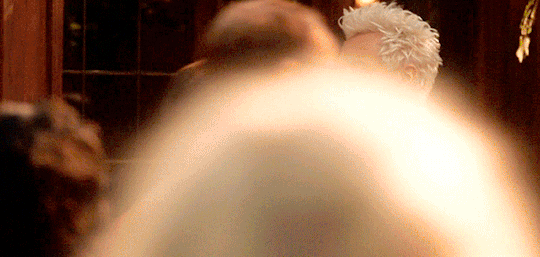
I realize I've got this far into this series of metas without really justifying why Crowley is standing in for Jesus. It started out being about Gabriel/Jim (we are still going to see more of Gabriel!) but understanding why...well, this is an echo from the past - part of the Great War of Heaven and the Fall being replayed in the present. Its a meandering mobius strip of a story line folding back over on itself and repeating. Perhaps I'll just point you back to this post for the time being while I'm still working on things (Its a long read, you might have to come back to it. But I'll cover a bit of it in the next part of the series.)
But back to Judas and Jesus, for context: Judas loved Jesus, but he was afraid for his people, the people of Israel (Heaven,) as well, and didn't want the might of Rome (Hell) to descend upon them. It would be far better to sacrifice just one person, Jesus, than many, so he agreed to the bribe and lead the soldiers to the arrest in the garden.
Jesus loved Judas just as much back, yet accepted the betrayal, and still called Judas his friend and loved him unconditionally. He had predicted he would be betrayed, and knew at the end of the hour in the Garden of Gethsemane that the hour had come. He had essentially asked Judas to kill him, then asked Judas to live with his guilt. (I think its expressed better in this short post. Very worth the read.)

Jesus was arrested, and taken away for trial.

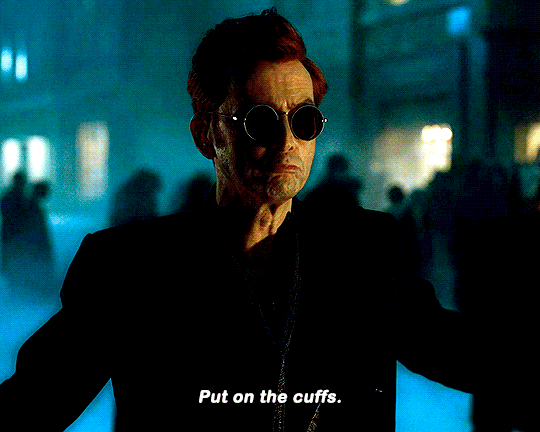
The Trial Before the Sanhedrin
The Sanhedrin was a council of elders who who were appointed to act as a tribunal. Jesus was questioned before them but answered little, and they struggled to find witnesses to testify against him. Eventually they accused him of blasphemy and sent him to Pontius Pilate in the morning.
Here we have Gabriel being trialed before the Metatron/Caiaphas and the senior Archangels. Gabriel saying "Nah!" was blasphemy towards the Great Plan, and enough to get him removed.
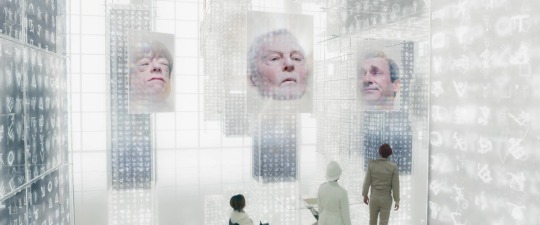
The Three Denials of Peter Michael
No. 1...
URIEL: So the miracle was nothing to do with Gabriel's disappearance then?
[in the back, Gabriel waves]
AZIRAPHALE: Gabriel? Oh, you mentioned you're looking for Gabriel.
MICHAEL: Did we?
AZIRAPHALE: Yes.
[Gabriel slams books together]
AZIRAPHALE: Mm!
GABRIEL: And see, the big ones can be used as fly swats. I know what you're thinking, but it's okay, because the beauty part is, it never works.
( fly buzzing )
MICHAEL: Don't I... Don't I know you?
GABRIEL: Yes. You do. I'm the assistant bookseller. I opened the door for you.
...No. 2...
URIEL: The traitor?
MURIEL: Yes. He seemed very... Traitorous.
URIEL: Hmm...
MURIEL: And his grumpy friend, Mr. Crowley.
URIEL: The demon.
MURIEL: Oh, I suppose that explains the grumpiness. Oh, and, of course, his... assistant? But I don't think I saw him.
MICHAEL: His assistant? He doesn't have an assistant.
MURIEL: No. Sorry, I don't know why I said that.
MICHAEL: Does he? Does he? Didn't we meet a someone, something... about... [clears throat] books?
URIEL: No, no. That's Aziraphale himself, he likes books.
...and No. 3.

I was going to conclude the trial with Pontius Pilate in this part, but on reflection it may be better to include it in Part 3 - Resurrection
#good omens#good omens 2#good omens meta#good omens analysis#crowley#aziraphale#gabriel#the metatron#the passion of jimbriel#agony in the garden#kiss of judas#i'm watching you always watching#1827 crowley#the final fifteen minutes#its alright officer I'll come quietly#michael#do i know you?
33 notes
·
View notes
Text
no offense but the takes people have about kendall being worse than logan bc logan carried his guilt over his sister’s death forever but kendall is mean to his siblings or whatever like… fundamentally you have misunderstood a lot about what kind of story this is, but also the crucial element to what the rose background reveals. this show is about cyclical abuse. it’s no coincidence that conservatism and capitalism are major motifs in a show about cyclical abuse, but the business is a red herring to what’s really going on, which is, again, cyclical abuse! we’ve seen previously little glimpses into logan’s past and the abuse he suffered: the switch marks, the references to his evil uncle, etc. what the rose story reveals is not that he blamed himself for his sister’s death, we’ve known that for some time, but that it happened when he was a child and aside from the fact it wasn’t his fault, he as a child was made to shoulder that burden by the adults in his life. the whole eulogy that ewan gives peels back the curtain to reveal, not the man but the boy. they were two scared boys on a boat speaking with their eyes. he was a boy sent away and isolated at school. he was a boy with a dead sister who blamed himself for it all his life. at the root of the villainous man is a scared boy. this doesn’t negate the harm he’s done or absolve him his countless sins. but when you look at the sibs, when they are treacherous and vile in their own rights, does the narrative not point time and time again to their childhood? we start every episode with a series of images of them as children, we are reminded of that time in their lives over and over again. so rarely are we given morsels of logan’s past, let alone of his boyhood, that we might forget that he was once something before he was the ceo. I feel like the point of that perspective is to not only make him seem impenetrable as a titan, but to make the audience see him wholly as the cause while the children are merely the effect. we know of course it’s more complicated than that. really, what is less revealed and more solidified is that the origin of the pain and abuse logan inflicted on the kids existed before him, and that same force will likely live on after him. so is kendall worse than logan? short answer: absolutely not. long answer: there is no better or worse when it comes to abuse, there is only pain transfigured. logan was a conduit of pain and he created conduits in his image, if smaller.
75 notes
·
View notes
Text
Kujou Sara, Scaramouche, The Wanderer, and the absurd
just to preface I'm not a philosopher nor a psychologist I'm just going to rant about this with the knowledge I have, if I made any mistakes please do feel free to correct me, this is just me rationalising my headcanon. More under the cut.
I. Kujou Sara, Scaramouche, The Wanderer, and the absurd.
For me, the wanderer (Scaramouche) is an interesting character from an existential stand point, although he is not human, his story tells one of the oldest features of the human condition: the search for purpose and meaning. The Wanderer, like us, did not choose to be born that way, he did not choose to experience the experiences that he had, and he did not choose the circumstances he was born into, it reminds me of the Heideggerian concept of "throwness". In throwness we were thrown into the world, born into the conditions outside of our control, you did not choose your parents, you did not choose the language you speak, you did not choose to be in your country, in your home now, we can't determine this condition but they effect how we perceive, experience, and live our lives. We have to play the part even if we don't know the lines. We come to being with these things outside of our own control, but we must deal with these things.
As such, The Wanderer did not choose to be ""born"", he did not choose to experience those three betrayals, he must simply deal with those things. Sara also had to deal with those things, as the adoption of the Kujou was not something she chose, she did not choose to be abandoned in the forest either, she did not choose to have an adopted father that doesn't really care about her making her lonely in the process, she was simply being thrown into her current circumstances and have to make do. To recognise all that, I think, it's crucial for the character development of both Sara and The Wanderer to accept that they were not in control of what happened to them, but does this mean they were not at fault or absolved of sins of whatever they do? absolutely not. But, accepting this notion, the indifference of the universe is important.
Let's explore the absurd shall we? Camus dictates that the absurd is not the universe itself, or ourselves in isolation, it is born out of their confrontation. The man's search for meaning and purpose in an indifferent universe, that whole action is absurd.
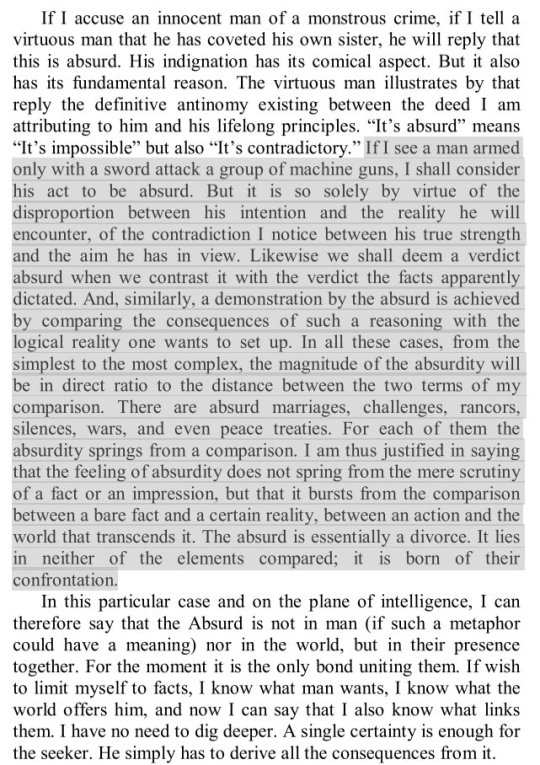
Man is born with a certain "nostalgia" for unity, for a reasonable world with meaning, but “This world in itself is not reasonable, that is all that can be said” he wrote. The Wanderer (scaramouche) faced all these head on. First, his creator, having finished her goal to make an experiment, abandoned him when she saw that doll, him, experience sentience itself (I would even daresay consciousness). So why did she create him just to abandon him after he actually could feel the experience of sadness, of fear, of a nightmare? Second, Niwa's "betrayal", why call him a human when he saw him as a monster? All of his efforts to make a new happy life, crumbled to dust, a futile attempt at happiness. Third, he came face to face with humanity's great equaliser: death. The child, powerless against his own mortality broke his promise to him, sealing yet another betrayal, yet another failed attempt at happiness.
It is after this moment, that he gained his tragic consciousness, it is tragic because, he, is conscious of his wretched condition. Indeed, where would his suffering be if he were not aware of his tragedy? "I wish I'd never been born at all" is the culmination of this, it is the realisation that life, is not worth living, that absolute nothingness is preferable to the tragedy of this life
Now, let's take a look at Sara, her entire life basically revolve around her devotion towards the Shogun, this idea, that the Shogun was responsible for her salvation, was, misguided at best. If my interpretation of Neuvi's story were correct, she was saved by a system and not a person, in which, even the archons themselves are not aware of who and what their actual ambitions are. It is akin to devoting your life to someone because of something that they didn't even do.
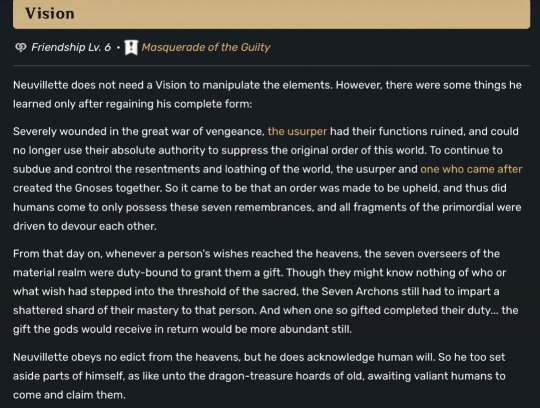
Ei was as helpful to her as a bystander that watched her fell from the cliff, when the vision granting system was the one who opened her parachute automatically and thus saved her life. Sara (reasonably) thinking that the parachute saved her life, devoted her life to whomever gave/produce this parachute, in this shoddy example, being Ei. While in reality, the thing that actually saved her, was the (perhaps) cold and indifferent vision granting system, only giving them to those who passed a current threshold.
II. Lucidity, suicide, and philoshopical suicide.
As I've eluded to in the previous section, the thought of death is prevalent in Scaramouche/The Wanderer's story, to live without something to live for is indeed a very arduous and difficult task but it is what he (and us) must do. To live without appeal, as Camus said. But what I'd like to explore a little bit is Sara's position. Sara, having a foreclosed identity from my observation, is the one most susceptible to existential and identity crises. It may take just one bullet of irrefutable truth to shatter her whole sense of being. Her entire identity and life, is devoted to the Shogun after all. She has no hobbies of her own, no friends to speak of, and any personal goals outside achieving eternity, in which, she doesn't actually even understand. I think it would be a mistake to say that she's committing a philosophical suicide as she is not yet lucid of the absurdity of life and the indifference of the universe. But, in her scheduled yet monotonous life, I believe that this realisation could happen and will if The Wanderer chose to tell her the whole truth what would this look like? At any street corner the feeling of absurdity can strike any man in the face, with the example below, the feeling of absurdity arises from the monotonous life, with "why" arising as the central question.
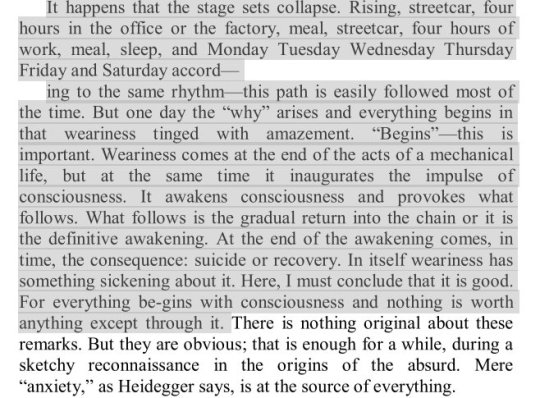
At this moment, the fabric of reality tears itself down, and everything become strange, a tree, a shrine, a chair, life, we could find ourselves questioning the reason for this all. And I also liked to think that, at this moment, after receiving the whole truth, from the Wanderer. Sara could then gain lucidity, why does she submit herself to the shogun? to fulfill eternity. why? to preserve Inazuma. why? so that the Shogun and Inazuma will be happy. why? so that I also feel happy. why? um, because their happiness is mine as well? what does it matter that you feel happy? because it's just better than feeling sad? why is it better? at some point I hoped she would realise "what's the point?" To which she will face the three following options: suicide, philosophical suicide, and embracing the absurd, let's explore them shall we?
First, philosophical suicide, to do this one must suspend all rationality and put all your belief, and most importantly, faith in something. It is not limited to religion, it could be also be applied to a political ideology, or even philosophy, it is to run away from the absurd. To put all your hope and freedom for tomorrow, to forsake the here and now in the hopes of achieving utopia down the line, no matter the way in which one would do it. Ei's old ideology of eternity is guilty of this. She deliberately chose to forsake the now for the sake of the future, maybe it is fear of death, maybe it is a fear of change, either way, her choice costed both her and all her relationships. Only with the help of the Traveler and Miko that Ei was able to overcome this.
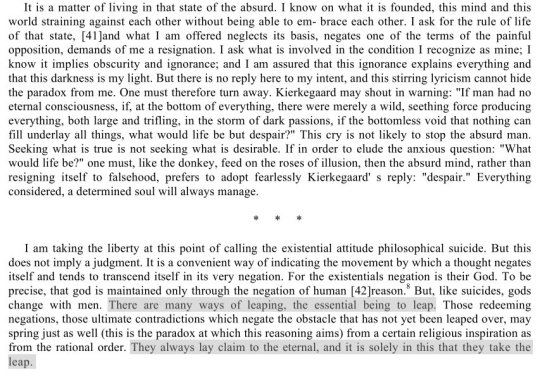
In the true fashion of children following their parents mistake, scaramouche was also guilty of this, in pursuing godhood, a middle finger to Ei, he deliberately chose to dirty and bloody his hands, even allowing experimentations on his own body, all to achieve an ideal which at the end, becomes futile. After some more shenanigans, Scaramouche, feeling the extreme guilt because of his actions chose to erase himself, a substitute for suicide if you will. But then, the absurd, the indifference of the universe strikes again he was not dead, merely forgotten, and in that moment of the death of consciousness he began to yearn for some sort of purpose and meaning again, the nostalgia of the condemned man. After regaining his painful memories, he is faced yet again with the fact that his life has no meaning nor purpose. Suicide, is then, is tantamount to saying that life, is not worth living, or that it is not worth the trouble. It is to surrender yourself to the absurd and be consumed by nihilist despair.
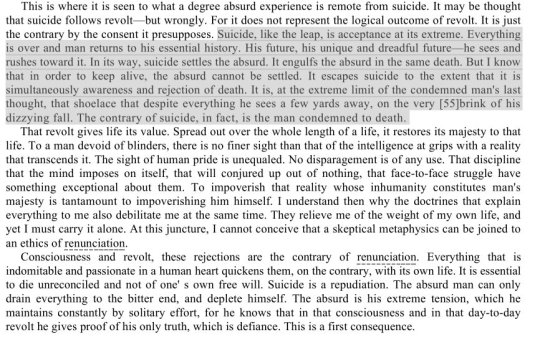
And I hope he would inform Sara about all this, as I hope that she will not take the first route, but the temptation for both literal and figurative suicide would still be high. And thus, the last option against the absurd will be explored.
III. Passion, freedom, and revolt.
So, what is this absurdism thing? It is to recognise the futility of life, the meaningless of existence itself but with a smile on our faces with an ever present passion, freedom, and revolt against one's circumstances. To have passion for living, passion for absolute uselessness, passion for the meaningless, I think Cioran said it best in this passage below
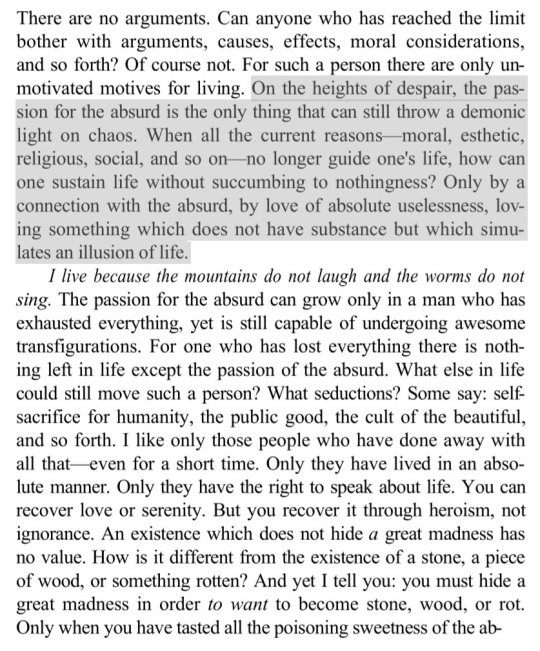

Next comes freedom, with an objective meaning (to achieve eternity) for example, it has to proscribe a certain behaviour tho those who embrace it, because the question of the meaning of life ties itself to the way we live that life. Thus, in embracing the absurd, the meaninglessness of existence, both of them could try their hand at this freedom. This also comes with indifference, which comes with the letting go of values. The protagonist of the stranger, Meursault, is fundamentally indifferent to everything that happened to him, be it her mother's death or his execution. Because he simply does not and cannot see any objective value that condemns him, the only thing he resents is the idea that he has to bow to a higher power/condemn himself. It is the letting go of value and significance. If we do not value comfort, how could discomfort cause suffering? If we do not value the judgement of others, how could they hurt us? Of course this is a hard thing to do, but Camus illustrates in his books that it is possible, lastly, to live in constant revolution, one always has to revolt against one's current circumstances, for example the goal of absolute purpose and meaning may not be achievable and defeat is ever present, yet this is how we keep the absurd alive, rebelling with the total lucidity that one would never be victorious. To rebel gives us clarity and greater ability to live in the present. Here is some quotes about the absurd hero to give you a better idea:
"An absurd human knows about his mortality and yet doesn't accept it, know the limitation of his reasoning, yet still holds it dear, feels the pleasures and pains of his experiences and yet tries to take in as much as possible."
"The absurd man will not commit suicide; he wants to live, without relinquishing any of his certainty, without a future, without hope, without illusions… and without resignation either. He stares at death with passionate attention and this fascination liberates him. He experiences the “divine irresponsibility” of the condemned man."
Camus share the dislike of hope like Nietzsche did, he thinks it robs us of much of the present, the hope of being free, of being happy one day, one must instead realise that they're free on every moment that heaven is on earth. As an example, Sara could not enjoy the beauty of Yoimiya's fireworks because she tied herself to the future, the hope of eternity, she could not live in the present.
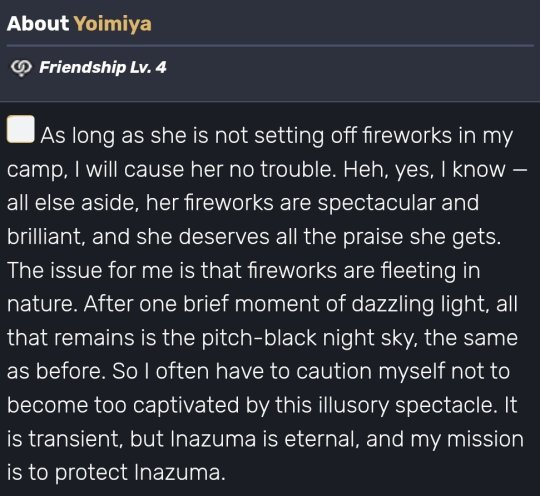
An absurd hero, meanwhile, recognises that the fireworks are fleeting in nature that the moment could not last forever, and yet enjoying them anyway, with the total lucidity that it is fleeting and it will end as a pitch-black night sky. And we move on towards the last part:
IV. The Myth of Sisyphus
I'm sure you've heard of this by now, be it through memes or something else. Sisyphus, the King who loved life on earth, was condemned to ceaselessly roll a rock to the top of the mountain, when, the rock would inevitably roll back down. "They had thought with some reason that there is no more dreadful punishment than futile and hopeless labor." And as such, I see this wretched fate also befalls our heroes, Scaramouche when he tried to make a life for himself and his pursuit of Godhood, only for fate, the rock, rolling back down again, his efforts futile and he himself forgotten, in the end his life, is a life without appeal, not for a God, not for a purpose. I also see this could be reflected in Sara, whence, she has fully grasped her situation, has to grapple with her now futile labor, the vision hunt decree, her efforts to be acknowledged by the Kujou all futile in the end. As I said before, if this myth is tragic it is because the hero is conscious, it is tragic at the rare moments when it becomes conscious. "I see that man going back down with a heavy yet measured step toward the torment of which he will never know the end. That hour like a breathing-space which returns as surely as his suffering, that is the hour of consciousnes."
This consciousness and lucidity, is also what will crown their victory. When Sisyphus chose to walk down from the mountain, aware of his torture, and yet doing them anyway. When The Wanderer decided to regain all his memories, no matter how painful, they're superior to their fate. And hopefully, with The Wanderer on her side, she too would be lucid of her torture, and yet continuing anyway. As Camus said "there is no fate that cannot be surmounted by scorn." The Gods only condemned Sisyphus to roll the rock up the mountain, they did not condemn him to resent the process. If one loved the process for the sake of the process that is thus the ultimate rebellion. This too, could be applied to the wanderer and Sara, to enjoy and love life, even if it seems nothing they do will ever matter in the end, even if it's just futile labor. Camus talked about enjoying the little things in life, the sea, the beauty of sunset, the smiles, the feel of snow, the fireworks. To enjoy the here and now, knowing what has happened has happened and the future will and could never be guaranteed. To live without appeal to a higher power, negating both suicide and philosophical suicide, to experience the quantity of life, embracing the absurd and smiling all the while, this is what I see sarascara could become and could explore. The Wanderer now, condemned to life without meaning, without purpose, to be abandoned to freedom, with the will to happiness, his rebellion is just starting, helped by Sara along the way. Sara too, would see herself in him, and together they could do something in this absurd life. I will end the with this:
"I leave Sarascara at the foot of the mountain! They always finds their burdens again. But Sisyphus teaches the higher fidelity that negates the gods and raises rocks. They too conclude that all is well. This universe henceforth without a master seems to them neither sterile nor futile. Each atom of that stone, each mineral flake of that night-filled mountain, in itself forms a world. The struggle itself toward the heights is enough to fill their hearts. One must imagine Sarascara happy."
#kujou sara#scaramouche#genshin impact#sarascara#the wanderer#absurdism#the myth of sisyphus#kujou sara x scaramouche#headcanon#philosophy#character study#shipping#ship dynamics
9 notes
·
View notes
Text
The Wolcott family is a complex tapestry of diverse opinions and thoughts, whether stemming from their inherent nature or fueled by their hopes for change. Who could have predicted that a family, renowned for its skills and abilities, would crumble under the weight of a single father's indifference? He seemed to care for his children, but his motives were askew. It wasn't a genuine affection that drove him to protect Sadie; rather, it was an aversion to admitting his failure, in what capacity, we may never truly comprehend – as a husband, father, or perhaps even as a son.
The mother bears some responsibility, though her culpability is mixed with her own struggles and regrets. She brought children into the world, even when she was ill-prepared to embrace motherhood. The first time, when Mikael was but an infant, it was more understandable, giving her a chance to contemplate her beliefs. Yet, 21 years passed, and she still couldn't acknowledge her eldest while favoring her youngest. She carries her own sins, ones that aren't easily absolved, especially after nearly sacrificing a life to save a stillborn, only for it to endure more suffering than anyone could have foreseen. The stress of guilt and Adam's demands clouded her judgment, but it does not justify treating her children as mere playthings, casting them aside when motherhood became inconvenient.
Her jealousy towards the memory of Adam's first wife, Eve, lingers like a shadow in the family's history. Envying that her children clung to her present then anything.
#scp foundation#scp au#MTF au#Wolcott Family#Adam Wolcott#Evelynn Wolcott#Eve O5-1#O5-1#Mikael Wolcott#J. William Wolcott#Theo Wolcott#Cassidy Wolcott#sadie wolcott
15 notes
·
View notes
Text
Final thoughts before Dead Friend Forever Finale Pt. 2
Tee: Tee is a character I could write a whole paper about to be honest. His character and the amount of backstory we get regarding him makes him a rich and multi-faceted character. One of the main things I personally like about the character and character design is that I know people like Tee (they are not as extreme in terms of money laundering) but Tee is a real person, and I would argue that part of the controversy and feelings regarding his character are just that; he feels real. Tee is also the most similar to Non which makes it even more tragic and painful what he does too Non both directly and indirectly. Tee also has one of the most complete arcs of all the characters narratively speaking. Tee is a teenager who is responsible for taking care of his father which is a physically and emotionally demanding requirement of someone his age. We do not know what happened to his mother, so we have no idea how long this has been going on. Much like Non, Tee is also a vulnerable teenager. He has no other support system than his uncle who is using him to make illegal money. Tee yes made the choice to work for his uncle and earn money that way and yes, he knew what kind of work his uncle does so him being naive that nothing would happen to Non just because he asked his uncle is exactly that naive. Just like Non who did not have a healthy support system at home neither does Tee. Tee is boxed into a corner, and I have seen several people who have said oh well Tee could have just worked at the gaming club to help his father instead of his uncle, he could have made a better choice. That I will personally argue against because we are told and shown point blank that in order for Tee to help Non get money by working at the gaming cafe, he was MISSING SCHOOL. If Tee had chosen not to work for his uncle which he did after school and seemingly on weekends, he would have had to give up his education and based on White’s comments Tee is actually very intelligent and scores well in school. For someone like Tee who is crying for a normal life and normal friends and for burdens that were not his to disappear why would if you were him, walk away from school where you have all that as well as an escape from your life; you would not, you would work for the Uncle too. Now here is where in my opinion Non and Tee differ, Tee took out his pain on Non. He is one of if not the main contributor to Nons pain and “death” and unlike Non who could admit that he put up with things for his own reasons Tee does not realize nor care about what he put Non through and even in present time cannot admit or apologize fully for what he did and the role he played. Tee made the wrong choices, and he kept making the wrong choices despite being aware of his own guilt. Tee admits himself that he felt like he did not deserve to have a happy life because of what he did to Non but it changed when he met White. I think not only is it probably the first time Tee has had someone interested in him passed the surface but White gives him love that he craves. I also think when Tee talks about changing that I think he sees White’s innocence and he is aware of what he could do to that innocence because look what he did to Non. As a character Tee comes the closest to a redemption arc but is once again just shy of true redemption as he never spoke up about what he knows about what happened to Non which could have saved Non’s family, he lies and never tells White about his past and his role with Non and even when he assumed they may be being haunted he could still not admit his role in what happened to Non but also his guilt. Tee is not absolved of his sins regarding Non just because he feels bad and wants to be a better person or wishes it went down differently. In the realm of consequences Tee should either have to live the rest of his life suffering his consequences or he should die helping White escape the house dying in a way that truly stops him from ever really getting out of the life he had and stops him from the life he wanted.
continued in part 3
#dead friend forever#dff the series#barcode tinnasit#be on cloud#copper phuriwat#dff spoilers#fuaiz thanawat#jj chalach#jjay patiphan#mio athens#bump pawat#us nititorn#jet jetsadakorn#ta nannakun#dff series#dff meta#dead friend forever the series#dff theory
5 notes
·
View notes
Text
Island finale + ... this one isn't for the weak
Pardon my french in advance. Of course there are spoilers in here. The blog is called "I love spoilers".

One last memory of Won Miho, a smart, intelligent woman, who went to Jeju island by her father's orders to teach ethics. I loved that awesome hair and fashion sense and self-confidence, determination, strength and cool temper. And drifting demon race in pt1. It's good they brought her back in those last few minutes, at least.
Shall we do this for the old times sake? Here goes.
Island Finale, what the hell did I watch?!
Ok, let's be graceful. The series got me exhausted. Being emotionally involved isn't the best option with this one... If you haven't watched it already and love the genre, expect mess, confusion and cognitive dissonance. Or not, it's fine.
My heart goes to two greatly significant characters. I can't stop thinking about them and I'm so grateful neither of them died by the other's hand . Putting aside both actors' charm, these two characters grew on me. One of them being a deeply misunderstood vengeful killer machine. And the other, adorable goofy exorcist.
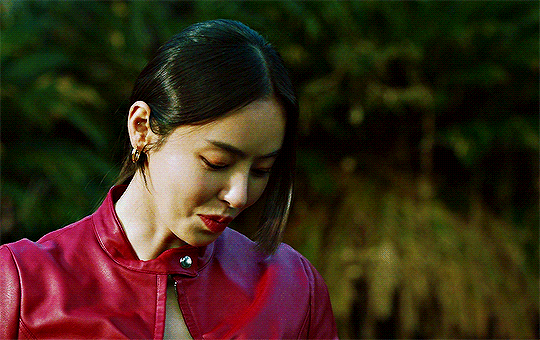
Since this two parts story finally ended, it made me think about half-demon brothers and why is it that one of them is utterly evil and beyond redemption in the eyes of our little Island community while the other one is practically absolved of all of his "sins".
Both brothers are trained killers (to be correct, abused since early childhood by Jijangjong Temple’s clan) and that's exactly what they've been doing their entire lives - committing murders. The only difference is:
One of them was lucky enough to turn into what he was supposed to become, according to plan - emotionless killer. Knife accepted him easily.
The other brother's transformation didn't go according to the plan. His feelings somehow never disappeared, pain and suffering destroyed him - he cracked under the pressure just as anyone would
First one believed that Wonjeong can give them their human lives back, his bloodthirst was ulterior motive (and I'll get to that a bit later)
The other was hypersensitive one and could see through the clan's lies. Even as broken as he was. His humanity made him trust Yeomji later on, making them both susceptable to Baek's clan manipulation
Were those two brothers really that different to begin with? Pan brought wounded Wonjeong back to the temple. After hurting her. Because he believed she could save them. By doing so he turned his back on his brother. Gungtan followed him knowing he'd get punished for it, his loyalty unmatched. While Wonjeong was living her life being trained to fulfill her destiny yet having a sense of freedom, boys were chained and starved. She would bring them food, but she never gained Gungtan's trust again - and his hunch was right. She was the end of both brothers.
If there's God in this story, then the moment Pan stabbed Wonjeong and a piece of divine crystal entered him was that God's doing. Pan gained a piece of humanity, by ending a life of a living person, accidentally or not. It never suffocated his urge to kill, but it made him more aware of all the lives taken by the lust demon and then by his own half-demon hands. That didn't make him less of a killer, but it did clear his mind of fog (which made him realise both he and Gungtan have to die in order to set themselves free), he gained control over himself and his impulse to kill - even though his yearning for Miho still made him want to kill her, let's not forget that. He is a lust demon, afterall, which does sound awfully like a vampire, but I'll let it slide.
Vampires, however, often end up killing their loved ones, unless they learn how to control their bloodthirst. I can't help but consider both of them vampires, in a way.

Boy got therapy and it (partially) worked. And everybody fell for him as if he's an angel sent from heavens and his past has been erased. That's not how it works, but fine. Fine. I'm fine with people being there for him. But something is not adding up here, there's still no sympathy for Gungtan. Why?
Ah, Gungtan, the villain. Once a boy who loved his brother so much that he gave up his own freedom/life for him. Took the beatings for bringing Wonjeong back. And turned his back on the whole human race for good. His love was the purest love they showed us, but it's not in the focus, so it's easy to run it over like it never existed. He ended up chained in the dark for years. No therapy. No nothing. Left to rot. Oh but he can't die, because he's not human. Torture lasted and lasted. Then he was set free only to be used again. Was mercy ever given to him in any way? Was he ever given any chance to become something different from what he became? Is there anything this demon-slayer knows of, other than abuse, punishment, betrayal and smell of blood? He is as self-destructive as it gets, there's no turning back from his path of soul torture. Character development inconsistencies are out there on the surface, so let's not go into that any further.
He's a hyperviligant killing tool but he can't stay indifferent towards a little girl covering his feet with her jacket. That was it for me. I couldn't care less about any other character at that point. I fell for the deeply wounded devil that he is. Completely. Why? Because I'm Bob the builder, duh. Because in the real world, where real and often horrible things happen, anyone can become a target of abuse and turn into someone like Gungtan. Often completely unaware of it. Leave out the killing and you have a very realistic character. Psychologically, it's a hell of a ride to get back up on tracks afterwards. And people think it takes a lot to become a villain, they don't have the potential, something like that can never happen to them, so why not wish death upon a fictional character who suffered more than enough for a thousand lifetimes.
I'm not buying any of the moralist-on-duty shit. Leave. Him. Alone.

I wish he could have run away that instant, somewhere, anywhere, before the Baek clan put their magic manipulation skills to work. I wish he was safe and in peace. I can't put any blame on him for what he became. And what he did. Especially since it is strongly suggested he was used like a puppet after they woke him up. His anger was used for a "greater" evil purpose. I can't help but wanting to reach out and get him the hell out of there.
Despite general opinion of the Island community and Mr. Gungtan himself, he isn't that different from his brother Pan at all. He cracked under the pressure, yet he didn't need a magical crystal fragment to sober up and help another abused child, which he wouldn't do if he had no feelings left in him. Pan believed in Wonjeong, Gungtan believed in Yeomji, but neither of those girls could help the brothers. And no matter how much they wanted to live, death was the only escape from the constant hellfire brought upon them. Gungtan needed to escape his untameable urge for revenge which led him to madness, Pan needed to escape the burden of his heavy dirty bloodthirsty soul.

May I add, Miho never sold out Pan, like Yeomji, who switched sides like a spineless creature. Yes, she's a kid and could never measure up to Miho. Her influence, if there ever was any, ended once Baek clan took over Gungtan. The same clan known for their magical manipulation skills. Gungtan's misery just doesn't stop. Once again he's nothing but a killing tool.
The brothers escaped their personal hell by ending their own lives - which is why I'm not mad about the ending. Their suffering stopped, at last. Finally. Their inner demons were swallowed by the underworld. Gungtan's little smile at the end, that sigh of relief as lust demon left his body and he was finally free, that moment was e v e r y t h i n g
But you know what else was everything? Seeing my favourite Island manhwa character coming to life on screen. Finally! Well done, cgi team, well done!

In previous life or death battle, my boy Gio almost died. Ahh, how many times I yelled at the screen for him to just stay out of other people's business but thankfully he survived it all. He is my favourite goofy guy who makes people write witty texts about him. The only priest, real or fictional, I've ever liked and will ever like. Look at this fluffball. Must. Protect. Him. (╥﹏╥)
Thankfully, Johan survived all the battles, which weren't even his own to begin with and which lead me to believe he'd meet a tragic end sooner or later. Ah but that's the part of his charm - sticking his nose in other people's business so we never know if he'll live or not. There would be some ugly crying if something tragic actually happened to him. And just like in pt1, he was left on hold while bleeding to death. This time it was even more horrible than before.

Pan, seriously? Like "brb, let me just-". I swear, at some point this thing turned into such a grotesque show. Plot has twisted so hard it was unbearable to watch at times. But, Johan picked himself up from the brink of death, thanks to his badass powers. Amen!
Despite the fact that finale brought so much sadness to entire audience, either for the main villain's death or PanxMiho not happening in a million years (which I'll forever be grateful for), that final fight was amazing. Writers finally gave us a large portion of enjoyable action. Plus, Gungtan wasn't the end of Johan and vice versa. Honestly, that's more than generous from their part, since Gungtan's downfall was imminent and it all went downhill long time ago, anyways.

Hope they don't bring us pt3. Sorry. I'm done with the massacre of manhwa plotlines and characters. Starred actors were amazing. Talent and looks, you know, everything. Especially absolutely stunning Lee Da-hee. Craaaazy talented and amazing Sung Joon♡ But. Please. No. More. Island.
Well, with too pure for this world cutie, I conclude my thoughts. It's been fun.
Sailor Pluto wishes you a great day and more enjoyable kdrama,
Till next time, xx
P.S. If you've made it this far, wow, congratulations. It must not have been easy navigating that pile of chaos. Also, there are so many things I edited out of the "original" text, trying to keep my cool. Also, if for any reason you (dis)liked my interpretation of fictional characters of Island, my ask box is always open. (◠‿◕)
P.P.S. Dear gifmakers, if you want me to remove any of your GIFs from my posts, please feel free to contact me, it will be done immediately. Thank you for all your work for our little community (✿ ♡‿♡)
#tving island#kdrama#gungtan#won miho#priest johan#kang chan hyuk#van#demon slayer#imsailorpluto#island kdrama
19 notes
·
View notes
Note
i just wanted to say i am completely unnormal about your pardoner oc Samson
stares at please please please please loredump please 🙏!! i love ds so eheh
Hi! I didn't forget about this ask, I've just been super busy and now I finally have a moment to answer it! Thank you so much for asking, I'll put my thoughts under a readmore bc it got long bc I kind of derailed talking about Carim in general LOL.
Since Samson is a bit of a new character, I'm still going to be working on developing him for a while, but I can tell what I do know!
I have a very big penchant for all things Carim- the land and people really fascinate me, and I like thinking about how it changed over the course of the series. I tend to believe that by DS3, the kind of pardoners we knew before aren't very common anymore (although Idk if they'd be completely gone either - we know that worship of Velka kind of seems to have fallen by the wayside, but I think there would still be people out there devoted to her, maybe some of them still even having ties to the church).
My HC is that the Church of Morne eventually became the major religious and political player in Carim once Thorolund kind of got absorbed by Carim (obv more my personal HC than canon but I think it's not so unpopular an idea), and worship of Caitha (who we know is likely to be Velka) is prominent. I think whether or not the people who worship Caitha know or believe in the Velka thing is up for debate and maybe even depends on proximity to the church or personal belief systems.
That being said, my pardoner is definitely doing his thing during the time DS3 would have been going on, because he's in a hidden relationship with another OC I have who is a Morne knight. I imagine they met during (the knight) Percival's training period, and that Morne knights overall are very much expected to keep their lives wrapped up with the Church (since you have to have a certain dedication to the faith to even become a Morne knight at all). I also HC that Carim has pretty traditional societal standards, judging from their views on knight- and maidenhood and chivalry. I don't think they'd be too fond of anything that goes outside of their brand of conservative thinking, so I doubt any sort of homosexual relationship would really fly, especially for people who's lives revolve around the Church. Hence Samson and Perci keeping their relationship secret.
I HC Samson to be really interested in and fascinated by Velka, I haven't quite considered all of what his beliefs about her being Caitha are but that's something I very much want to uncover and work on bc it's something I like to explore with all my Carim OCs (I have a problem). Outside of all that, he's a pretty private, quiet, reflective person. He would rather listen than talk, which makes him very suited to listen to confessions and help absolve people of their sins. I could go into his ideas on sin and his more personal "relationship" with Velka but maybe another time lol. Unfortunately, his story is kind of fucked up and sad, bc Idk, that's just how I like it.
During the time that he and Perci have grown close, Samson has suffered an illness that would eventually be fatal, though he's held it off through the use of healing miracles only for it to come back with a vengeance each time. In the end, before Perci is set to leave Carim with his maiden, Samson confesses this to him because he's been keeping it a secret in order to not worry Perci. He eventually decides he'd rather simply die than have to live that way and especially without Perci, so he does pass away before Perci heads out. Perci is already a sort of cynical person, but this really shatters his spirit. I won't get too much into Perci's own thing, but he and his maiden have a pretty shitty relationship initially and she's quite cruel to him even though they reconcile and part later.
I'm sorry for rambling a lot :x but I really appreciate this ask and getting to talk a bit about some of this stuff! Thank you again!!
#ask bug#patchesenthusiast#my ocs#pardoner samson#percival the tear-stained#wish i could be normal about this shit lmao
5 notes
·
View notes
Text
okay but marriage to the one you care about as punishment, and this upsets you more than anything
that’s such an interesting character arc for hua shu tbh…
like i enjoyed her weighing the pros and cons for her suitors (gujin and the not-yet-heavenly emperor). didn’t particularly like her being bitchy to a’yin, but… if her motivation has always prioritised what is best for the peacock clan, then… i could sympathise with her callousness tbh
like i don’t know if hua shu actually liked the heavenly emperor, but from a strategic standpoint, he’s clearly the better and more preferable option—at least while unaware of gujin’s true heritage, at least
so she toys with gujin and flatters him, bc he still has potential, as a candidate, still can be used for the good of her clan
but then stuff happens, and the now heavenly emperor proposes, knowing the manipulative things she’s done, who loves her despite that
and… it’s a strange safeguard
her sins will be reflected onto him, if she acts out of line. he will suffer, reputation will go down if she does not act as a befitting empress, now a unit
like she could be sneaky and act behind his back. but if she gets discovered, it’s going to have worse repercussions on the heavenly emperor, who will be held accountable for his ignorance and not realising sooner to take preemptive measures for her corruption
(like i was so into wuhan/gujun in alp, but the last couple of episodes absolutely stunned me with wuhan and her husband, with the absolving and refusal to admit wrong, and going mad afterwards)
like hua shu feels shame and guilt, so… i’m just extremely curious about the path she’s going to take, to want to act in the best interest of her clan, but to also not make the emperor look bad if she abuses her power
she does care about him, or else she wouldn’t feel this conflict, i think.
but it’s put her in such a fascinating predicament
and i’m invested in them now
1 note
·
View note
Text
The Sin Thesis
The Sin Thesis
Can you deal with your own sin?
The Christian response is no. Christ died for our sins because humans cannot do anything to rid themselves of their sin debt. We, according to the Sin Thesis, must rely 100% on the saving grace of Christ, to pay for our sins and provide us with salvation. Which is why Jesus died on the cross. There is no path to salvation other than through the saving grace of Christ.
But that thesis, while attractive, is not actually true, let me explain.
Jesus died for our sins, he took our sins on himself, he took responsibility for the sins of the world. He died for them. This is true.
Jesus confronted evil in the desert, was tempted but was prepared to suffer ignominy and deprivation, to deal with the issue of evil, even unto death. Jesus did not perpetuate evil yet; he was prepared to accept the responsibility of ending its perpetuation.
He had no sin and so his death did not absolve him of sin, being himself, sinless. His death, being sinless, was able to pay for our sins.
We, as humans, cannot die and absolve ourselves of our sins. We are not sinless. Our death does not do a thing for us. It simply ends the amount of sin we do.
We cannot confront the evil in ourselves, directly. We cannot stop sinning nor can we make any sacrifice that will pay our debt sin, because our life is not worth anything, being corrupted.
But we can accept responsibility for sin, as a perpetuator of evil. We can accept our role in the perpetuation of evil.
Our sin is, in a real sense, a perpetuation of evil. Our sin does not harm anyone but ourselves, directly. Homosexuality is not an evil, in the real meaning of evil, it is a sin. But it is a sin that perpetuates evil.
Because we engage in sin, we perpetuate it, and that is evil.
When we see harm being done, we can walk away. This is a sin, because it perpetuates evil. This need to not be a perpetuator of evil, is the origin of duty. Jesus had no duty, no obligations, but he took on the ultimate of all obligations and fulfilled the greatest of all possible duties.
This is where a disconnect occurs, because Christ was sinless, we think there is nothing to learn from him, as sinful persons. He did not have sin to deal with, he was perfect. Therefore, we who are in sin, have nothing to learn from him. We can superficially try to be like him. We can model his compassion and empathy, but it is consciously on a superficial level. No one seriously tries to emulate him, because he was a life never to be replicated.
However, as a mirror, his life is the most important lesson Christ gave us.
Christ is indeed sinless. All persons, on the other hand, are in sin.
Jesus did not have to deal with a sin nature.
We as humans cannot deal with ours. We are dead in our sin. So, in that sense, we are in the same place, instrumentally, as Jesus was in sinlessness. He needed do nothing and we can do nothing. At least we can do nothing individually, for ourselves.
This is why the church exists.
If there is anything about Christianity that mankind does not understand, it is the church. We seem to be more aware of what the church is not, than what it is.
This is why an unfortunate understanding of faith emerged. Jesus died for our sins. But this death was not for individuals, it was for the church. We are alive in him, as the church. We are brought to grace by means of the church.
We are the bride of Christ, as the church.
Many will call Lord, Lord whom Jesus will say he never knew, because they call him as individuals. Jesus does not know us, outside of the church. He came for his bride, and this is not you or I, it is us.
This is a serious issue, the ramifications of which no one fully knows, but Christ himself. Who is saved is up to him and no one can guard the gates of heaven but our Lord. But what the Bible says is clearly seen.
There are two groups, the saved and unsaved. These are known as the spirit and the flesh. In community terms, one group are Babylonians, and the other is the church. We can also refer to these groups as liberals and Evangelicals.
The two groups constitute two races. This cannot be disputed. It is true and obvious. The two groups or races, have the same physicality, but we are not to interbreed. We are to stay apart. Indeed, the races even if biologically comparable, are spiritually irreconcilable. To understand this, it only needs to be remembered that while we are born in sin and the flesh, we must die in the flesh and to sin, to enter the church of God. Therein lays the problem, because the church is not of this world. It is of the spiritual realm, and it is certainly not an institution of the state. We must die to the state and all of its allies and elements.
Christians were meant to separate. However, Protestants swore fealty to the state as a way to gain protection from Catholicism. Which means if Protestantism is a reaction to Catholicism’s unbiblical elements, and Protestants aligned with the state as a compromise with evil, there is no church that endorses what God has decreed to be his bride.
Christendom has universally felt justified in over-ruling the decrees of God for earthly power.
This is interesting because without God, all we have left is power, or the law of the jungle. All law, regardless of its merit, is dependent on and relies on, the law of the jungle.
In nature, might makes right and the end justifies the means. There is no way to overthrow or supplement this law, other than by the very use of the law that we say ought to be replaced. Without the use of brute force or the threat of force, no law can be enacted or repealed.
Which brings us back to the church.
Force is required for only one reason, and that is to deprive someone of what rightfully belongs to them. If all were honest and no one claimed what they had no right to, there would be no war or crime and we would not need the state.
Try and argue that point and if you cannot argue it, then figure out what kind of person will never claim what is not his, including the elements of physical reality? Probably you cannot even understand what this means, or what such a culture would look like. That is because you are of the flesh, and you live in a culture of the flesh. Those unable to understand a life without parasitism, are to some degree parasites, or allies of them.
So, then we need to be introduced to a culture of the spirit, to be saved. But while reading this, think of this as the path to salvation. When we build the church what we are doing is learning to live in the spirit.
There is a reason we need to separate from the world. The flesh and spirit cannot be reconciled. We are two different races and realities and cultures. There is no concourse between us and them.
The irreconcilable difference is centered on church and state. Despite what Protestants might believe, the church and state are not allies. But when one lives, as if the church is a cross between lecture hall and entertainment venue, one might be excused for thinking it is an arena that needs regulating and licencing by the state,
Christians are now faced by a plethora of options that range from popes to gay witches running what is said to be a church and everything in between. Obviously not all can be what the Bible calls a church, but it is quite possible, indeed probable, that none of them are.
Which brings us back to the issue of sin. If the church is not a vehicle designed to eliminate sin, it is certainly something intimately connected to the neutralization of sin. The church blocks the transmission of sin and negates its ability to perpetuate itself.
But nothing will make sense until we understand what the church is. Our grouping in the dark for meaning, along with our borrowing from secular models for understanding, has left us with something that makes no sense and does not work, which is the worst of both worlds.
Yet if we go back to the simple, unassailable fact that we cannot own what we did not create, we realize whatever we think the church is, or is not, the one thing we can guarantee, is that the church is not a vehicle which Christians can use to claim ownership over assets. Indeed, it must be the very apotheosis of this.
This goes as far as negating that famous and oh so wrong claim, that we own our own bodies. We did not create our bodies; how then do we have an unassailable right to them?
Then what do we own? We own the value we add, both to our bodies and to the world generally. This can be measured and tracked. God is a God of order; He did not create subjective reality or situations that operate by what we feel.
The church is not just a way to obey God and add value to His Kingdom, it is a way to measure our value to others, as a Christian. The church is therefore a methodology, in the same way science is a method of validating claims. The church validates faith and gives us a way to fulfill our responsibilities to God and His people.
We are saved by faith, but this is a collective faith. The reason why Christians are confused by works and faith, is because they have rejected the church envisioned by God. Christians have tried to make faith an entire personal and subjective thing, when it is tied inextricably, to the church.
No one can specialize in isolation, and no one can create real value, as a hermit. Civilization and progress require innovation. All innovations begin in the mind of an individual, but all progress comes through specialization. Without specialization and progress, the innovation anyone can imagine is constrained.
A digital economy has to exist before computer chips can be a source of inspiration and innovation.
But this is where church and state become irrevocably divided, because to experience the full impact of innovation and specialization, we must respect the rights of the creator to what he or she created. Not only can the state not do this, but the state is also the engine through which parasitism flourishes.
In every case of state failure, there is a state that has maximized parasitism.
It does not matter if the state favors rich or poor, the only thing that matters is the level at which parasitism flourishes.
And so, the picture in Eden in which Adam and Eve partake of a fruit that was never theirs to eat, is the only picture one needs, to understand good and evil and the role and purpose of the church. We have to eliminate parasitism. This requires we as a church pledge to stop the perpetuation of evil.
Here’s the rub, we cannot do this singularly. We can become better people, by some random index. It is at this stage that atheist claim they can be good, in the same way Christians become good. This is because at the individual level, we are the authors, agents and scorers of our own value. But this is not the church.
The church defines our moral worth. The church is a methodology that verifies our moral score. We cannot be good without God, because we cannot be truly good, without the church.
Without the church we are the blind followers of a blind guide.
When we are saved by faith, it is not us in the singular, but us in the plural. It is the church that is saved by faith because the church is the work of faith, that stops our faith from being dead.
We are in the church, and we are the church only insofar as we are not of this world. The building of the church is simultaneously, the tearing down of Babylon. There is an inverse relationship between the building up of the church and the destruction of Babylon.
It all comes down to a methodology for promoting specialization, protecting the rights of the creator and eliminating the state and more generally, eliminating parasites.
To do this, we need to be able to administrate a flat organization. We need to eliminate the use of the law of the jungle, disparities of power and administrative hierarchies. The church is, by its existence, an objective standard of comparison. We are growing the church or growing the state. There are no other options.
The first step we need to take, is to separate from the state, meaning we cannot own that which is owned as a licence from the state. The state has no authority to licence the physical world to us.
We need an accounting tool that does not rely on a monetary unit legitimized by the state.
We are the church, we have dominion over the earth, as the body of Christ. We are the Bride of Christ. But we have a duty to each other, though no one has explained where this duty comes from or what it is.
We must build the church. This duty is not imposed on us from without. The duty is intrinsic to being Christian. If we wish to adopt the mantle of faith, we are compelled to accept the duty to build up the church. This is identical to building up ourselves.
This is not an obligation to be a carpenter or electrician. It is the duty to change who we are to reflect Christ. This encompasses what the Bible refers to as looking at the beam in our own eye.
To do this we have to build the church, because if we wish to be parasites, we need the state. Parasites need the power to control and oppress others. Only by building the church can we focus on self-transformation. The church, therefore, is inversely related to the state and its parasitic activities. To build the church we reduce parasitism. By ceasing to be parasitic, we align with others of the same kind, and this eliminates parasitism further.
The Christian understanding of sin as something Christ rids us of, through our faith, is not a subjective experience. The devil surely believe in Jesus more than any human can. It does not save him.
Our faith is expressed by our building the church. This is a work, and it expresses faith. Salvation is not a subjective experience that occurs between a believer and Christ, but between the bride of Christ and the bridegroom.
We cannot serve two masters. The bride, by giving herself to Christ, rejects that other suiter, Satan, through the rejection of the flesh. The denial of the flesh is a denial of sin and Satan.
To build the church is to reject the state and parasitism in all its forms. As we eliminate parasites and parasitism, we build the church. The church being a life lived free of parasitic activity. This is faith and works combined in a life separate from those of the flesh.
0 notes
Text
There’s TWO Purgatories? Aquinas Says Its Entirely Possible

There is perhaps no other Catholic dogma that is more subject to abject scrutiny, and also more misunderstood, than that of purgatory. Detractors will the call the notion an unbiblical or even pagan invention, but that couldn’t be any further from the case. What exactly is purgatory?
According to the Catechism of the Catholic Church, purgatory may best be thought of as a process, or state of purification:
“All who die in God’s grace and friendship, but still imperfectly purified, are indeed assured of their eternal salvation; but after death they undergo purification, so as to achieve the holiness necessary to enter the joy of heaven. The Church gives the name Purgatory to this final purification of the elect …” – CCC 1030-1031
Purgatory is the place children of God go to upon their death, where while they were in a state of grace and free of mortal sins, were guilty of venial sins or failed to do full penance for sins already forgiven. Purgatory is not a last-chance opportunity where unrepentant souls can get a chance at Heaven, instead it is a place where people are purified of any attachment to sin. Following death and after being prepared for Heaven in purgatory, purified souls will enter into enjoy the fullness of the Beatific Vision.
Why is purgatory necessary?
Why is purgatory necessary if Christ died for our sins? If we die in a state of pure grace with no blemishes on our souls, we go to heaven. If we die having not confessed our sins and repented, we go to hell. A majority of us wont fit either extreme when we die, we fall in the middle and cannot go to Heaven or Hell, we must go to purgatory. As we know, nothing impure can enter Heaven. Therefore, Christ dying for our sins is precisely why we need purgatory. How can God have given us His only Son so we may have eternal life, if the majority of us upon death would not be pure enough to enter heaven? The answer is we are purified of our attachment to sin in purgatory as a final step so we may achieve heaven.
“But nothing unclean will enter it, nor any[one] who does abominable things or tells lies. Only those will enter whose names are written in the Lamb’s book of life.” – Revelation 21:27
Support for purgatory
Purgatory, while not explicitly stated in the Bible, is implicitly found and referenced to many times. The first mention comes in the tale of heroic Judas Maccabeus, who following a battle when to collect bodies of his fallen men, discovered some of them had amulets to false idols which was against the law at the time. They prayed for their fallen brothers so their sin may be wiped clean.
“But under the tunic of each of the dead they found amulets sacred to the idols of Jamnia, which the law forbids the Jews to wear. So it was clear to all that this was why these men had fallen … Turning to supplication, they prayed that the sinful deed might be fully blotted out. … Thus he made atonement for the dead that they might be absolved from their sin.” – 2 Maccabees 12:40,42,46
Another reference comes during the famous Sermon on the Mount, where Jesus is very explicit about purgatory. We know that there is no liberation from the torment of Hell, nor does anyone in Heaven have a penny to be paid; therefore, Christ is referencing a third place upon which we die the penny shall be paid and our souls purified.
“Settle with your opponent quickly while on the way to court with him. Otherwise your opponent will hand you over to the judge, and the judge will hand you over to the guard, and you will be thrown into prison. Amen, I say to you, you will not be released until you have paid the last penny” – Matthew 5:25-26
An even more straightforward reference comes Paul’s first letter to the Corinthians.
“The fire will test the quality of each one’s work. If the work stands that someone built upon the foundation, that person will receive a wage. But if someone’s work is burned up, that one will suffer loss; the person will be saved, but only as through fire.” 1 Corinthians 3:13-15
Paul clearly speaks the works of the Faithful will be tested after our death, through a figurative fire. Scripturally, fire here is used as a purifying agent. What Paul talks about cannot be Hell, because souls are being saved. However, it cannot be Heaven because there are imperfections of the soul that must be burned up. What exactly is it this place, not of Heaven or Hell, where our imperfections are burned up? Purgatory.
What did early Church Fathers have to say about purgatory?
The concept of purgatory has been part of the true Faith since before even Christ, as seen evident in the tale of Judas Maccabeus. Early Church Fathers supported the doctrine of purgatory.
In Tertullian’s writing on monogamy in 216 A.D., the idea of praying for the dead was prevalent during the early years of the Church.
A woman, after the death of her husband … prays for his soul and asks that he may, while waiting, find rest; and that he may share in the first resurrection. – Monogamy 10:1
Saint Augustine more clearly defines the doctrine in his most famous work The City of God, and also describes the difference in judgment for venial versus mortal sin.
“Temporal punishments are suffered by some in this life only, by some after death, by some both here and hereafter, but all of them before that last and strictest judgment. But not all who suffer temporal punishments after death will come to eternal punishments, which are to follow after that judgment” -The City of God 21:13
What’s more, according to Thomas Aquinas, there are TWO purgatories! And it’s why we have ghosts!
“It is probable, however, and more in keeping with the statements of holy men and the revelations made to many, that there is a twofold place of Purgatory.”
The first purgatory is as above in the Catechism.
“One, according to the common law; and thus the place of Purgatory is situated below and in proximity to hell, so that it is the same fire which torments the damned in hell and cleanses the just in Purgatory; although the damned being lower in merit, are to be consigned to a lower place.”
But the second purgatory is one in which spirits are allowed to come back to Earth and “haunt” the living – and by haunt request prayers from the Faithful so they may get out of purgatory.
“Another place of Purgatory is according to dispensation: and thus sometimes, as we read, some are punished in various places, either that the living may learn, or that the dead may be succored, seeing that their punishment being made known to the living may be mitigated through the prayers of the Church.”
0 notes
Text
#DailyDevotion The LORD Jesus Saves Us In Our Distress

Psalm 107 10Men sat in darkness and gloom, as prisoners in misery and iron chains 11because they rebelled against the words of God, and scorned what the Most High had planned. 12So He made them weary with work to humble them, and when they fell there was no one to help them. 13Then they cried to the LORD in their trouble, and He saved them from their distress. 14He took them out of the darkness and gloom and tore off the ropes that bound them. 15Let them thank the LORD for His goodness, for doing wonderful things for men, 16for smashing the gates of bronze and cutting the iron bars in pieces.
The psalmist is most likely looking back at their time in Babylon. The Jews had rebelled against the LORD by worshiping other gods and not living according to His commands, precepts and laws. Everyone followed the lust of their hearts. Sinning causes us to become slaves to sin. He made the Jews slaves to the people whose gods they served and/or emulated in their lives.
God does this to us as well. God punishes sin with more sin. He gives us up to the very thing we give ourselves to serve. He does this in hopes that we would recognize our hopeless estate and cry out to Him for help. In some circles it is called hitting our bottom. If we cry out to our LORD Jesus Christ for help, if we turn to the Father of lights, He will save us in our distress. He will take us out of the darkness and gloom. He will tear off the ropes that bind us.
We see with the Jews with their captivity in Babylon, the LORD sent Cyrus the Persian to break the gates of bronze at Babylon's city gates. He used Cyrus to free His people and to send them back to Judea. The LORD may very well send people into our lives with His good news of salvation to free us from our sins, to break the ropes of bondage with the forgiveness of sins for Jesus' sake. The Gospel of Jesus is the light that disperses the darkness and gloom of our sins. We should thank and praise Him for His goodness and for doing these wonderful acts of salvation in our lives.
17Fools suffer for their wicked ways and the wrongs they do. 18They detest every kind of food, and come near the gates of death. 19Then they cried to the LORD in their trouble, and He saved them from their distress. 20He sent His Word and made them well and rescued them from the grave. 21Let them thank the LORD for His goodness, for doing wonderful things for men. 22Let them bring sacrifices to thank Him, shouting happily as they tell what He did.
Our sins often come down upon us and cause us great distress. We should probably pity the man who doesn't experience this because of his sins. He will never learn his need for salvation. Yet some of us are fools enough to suffer greatly for our sins that it brings us to the point we cannot eat and we approach death's door. Such fools, if they are so blessed, have someone the LORD sends with His Word which makes them well and rescues them from the grave. The LORD send prophets to the Jews in and after their captivity to Babylon. They comforted the people and strengthened them. We have at the very least the pastors the LORD has given us to hear our confessions, absolve us from our sins and bring us to the Table of the LORD that our faith may be strengthened and our spirits refreshed. The LORD may send other Christians into our lives who will strengthen and build us up in our walk with Christ. We should pray the LORD not let us get so wrapped up in our sins that we get to this point. We should pray that we repent quickly to not let our sins enslave us again. Finally we should give thanks to the LORD who hears our cries for mercy, gives us the power and the Spirit to overcome our sins when we cry to Him and tell others joyfully how the LORD Jesus Christ has delivered us.
Heavenly Father, we give You thanks and praise for sending Jesus Christ, You Son, to deliver us from our bondage to sin and death. Always hear our cries for help and give us Your Holy Spirit that we not give ourselves as slaves to sin again. In Jesus' name we pray. Amen.
Read the full article
0 notes
Text
TOPIC: Don’t Be A Prisoner Of Your Past (Rhapsody of Realities 15 May 2023)
Therefore if any man be in Christ, he is a new creature: old things are passed away; behold, all things are become new (2 Corinthians 5:17).
Rhapsody Of Realities For Today MESSAGE:
There are those who are haunted by guilt and memories of the I past. They’re fighting so hard to overcome painful memories. They’re in bondage to their past, probably because of some terrible things they had done or the hurt they suffered, and they’ve been living with the pain ever since.
You need to understand what it means to be born again, to be a new creation: you’re a brand new person. You’re not the same person who had those horrible experiences. That person died in Christ. The new “you” is absolved of all guilt; free of errors and imperfections.
Romans 5:18 says, “Therefore as by the offence of one judgment came upon all men to condemnation; even so by the righteousness of one the free gift came upon all men unto justification of life.” Jesus wasn’t only delivered on account of our sins, He was also raised for our justification (Romans 4:25). What does this mean?
It means you were declared “not guilty”; no charge against you. The reason is simple: you’re a new creation; a brand new person without a past. So, even if you did something wrong in the past that still makes you feel guilty, it’s all based on memory and emotions. In Christianity, we don’t walk by our feelings; we walk by faith. We live on the affirmation of God’s Word.
Don’t recollect a bitter experience you might have had many years ago and start crying that God should forgive you. Refuse to be held captive by guilt or memories of the past.
Romans 4:25 AMPC says Jesus was raised from the dead for “… (our acquittal), [making our account balance and absolving us from all guilt before God].” When you come to Jesus, He makes you free from every kind of bondage: “If the Son therefore shall make you free, ye shall be free indeed” (John 8:36). Hallelujah!
PRAYER
Dear Father, I thank you for my new life in Christ; your divine nature in me has made me a master over circumstances, with dominion over the systems of this world. I serve you always with joy unspeakable and full of glory, unencumbered by sin or reproach! Thank you for making me righteous, holy and irreproachable in your sight, in Jesus’ Name. Amen.
FURTHER STUDY:
Galatians 6:14-16 (KJV); 14 But God forbid that I should glory, save in the cross of our Lord Jesus Christ, by whom the world is crucified unto me, and I unto the world. 15 For in Christ Jesus neither circumcision availeth any thing, nor uncircumcision, but a new creature. 16 And as many as walk according to this rule, peace be on them, and mercy, and upon the Israel of God.
John 1:12-13 (KJV); 12 But as many as received him, to them gave he power to become the sons of God, even to them that believe on his name: 13 Which were born, not of blood, nor of the will of the flesh, nor of the will of man, but of God.
Romans 6:4 (KJV); 4 Therefore we are buried with him by baptism into death: that like as Christ was raised up from the dead by the glory of the Father, even so we also should walk in newness of life.
1-YEAR BIBLE READING PLAN:
John 7:1-24 & 1 Kings 15-17
2-YEAR BIBLE READING PLAN:
Mark 10:23-31 & Numbers 18
0 notes
Text
Systemic Racism and Implicit Bias
youtube
Catholic social teaching has long recognized that "racism is a sin." I think that many Catholics/Christians are aware of this and even agree with this. But what becomes more difficult to guage is how we experience racism and discrimination in our own society and within ourselves. This becomes very difficult when culturally we accept certain systemic policies that are, by their very nature, discriminatory to a particular race of group.
Systemic racism is a reality here in America. The video above allows us to understand this phenomenon and how it exists within our American society. In 2018 the US Bishops promoted an updated teaching on racism and discrimination called "Open Wide Our Hearts."
We have also seen years of systemic racism working in how resources are allocated to communities that remain de facto segregated. As an example, the water crisis in Flint, Michigan, resulted from policy decisions that negatively affected the inhabitants, the majority of whom were African Americans. We could go on, for the instances of discrimination, prejudice, and racism, sadly, are too many.
Calling out systemic racism or discrimination in our society is a very sensitive thing. To many Americans who identify with the former culture this is seen as unpatriotic and sometimes unamerican. As one who is proud of the values of our nation but who is also aware of the deep contradictions that these values have with aspects of its own history I very much want people to know that we can love what our country stands for and push for it to always strive to become a better version of itself. As the poet Langston Hughes said in his poem "Let America be America Again:"
O, yes,
I say it plain,
America never was America to me,
And yet I swear this oath—
America will be!
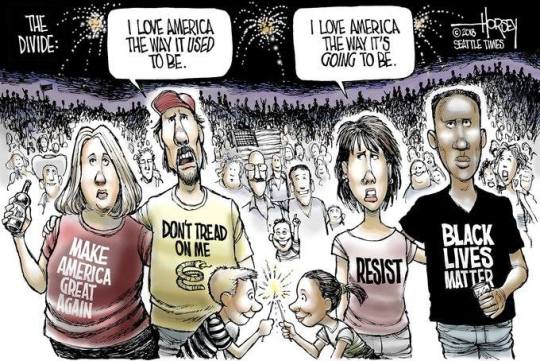
Carlson's confession
Systemic racism exist deep within the social and cultural fabric of our society. We do not even question it until we can step back from it. As the US bishops stated in their 1979 pastoral "Brothers and Sisters to Us."
The structures of our society are subtly racist, for these structures reflect the values which society upholds. They are geared to the success of the majority and the failure of the minority. Members of both groups give unwitting approval by accepting things as they are. Perhaps no single individual is to blame. The sinfulness is often anonymous but nonetheless real. The sin is social in nature in that each of us, in varying degrees, is responsible. All of us in some measure are accomplices. As our recent pastoral letter on moral values states: "The absence of personal fault for an evil does not absolve one of all responsibility. We must seek to resist and undo injustices we have not ceased, least we become bystanders who tacitly endorse evil and so share in guilt in it."
Tucker Carlson is a famously controversial Fox News correspondent who recently lost his job because of the misinformation and biased perspectives that he shared in recent years. Personally, I really do not like him and could not imagine anything good coming from him and his prejudicial mouth. But America magazine reflected on a recent confession from Carlson that we should all consider. It was a confession of how he felt as a group of men attacked a protestor he didn't like.
Yes, I suddenly found myself rooting for the mob against the man, hoping they’d hit him harder, kill him. I really wanted them to hurt the kid. I could taste it. Then somewhere deep in my brain, an alarm went off: this isn’t good for me. I’m becoming something I don’t want to be. The Antifa creep is a human being. Much as I despise what he says and does, much as I’m sure I’d hate him personally if I knew him, I shouldn’t gloat over his suffering. I should be bothered by it. I should remember that somewhere somebody probably loves this kid, and would be crushed if he was killed. If I don’t care about those things, if I reduce people to their politics, how am I better than he is?
This is the type of reflection that many of should reflect and consider. I am personally ashamed of the fact that I was repelled by this confession because I had judged Carlson's humanity and would not initially accept that he is capable of being a decent human. That is my own bias where I prejudice certain people based on what they say and how they are portrayed. In other words, the insight that Carlson had is one that I, and perhaps many of us, also need to reflect on. Carlson confessed his implicit bias that was deeply woven into the structure and value of his political association. He even went so far as to question this particular bias.
In the TED talk below, Dushaw Hockett walks us through the science of implicit bias and how we can respond to it. I believe, like Dushaw, that identifying our own implicit bias is essential in helping us move this country forward.
youtube
Identifying our own implicit bias is the first step in addressing our own participation with systemic racism. Here is the link to "Project Implicit" and their resources that can assist us along this journey. Self-change is a part of Ignatian spirituality and the Examen is prayer tool that we can use to help us with our own implicit bias. But the tools that Project Implicit may also help us discern this further and help us grow beyond our implicit bias and challenge systemic racism.
I want to also share this UN website with further resources on identifying cultural and systemic racism.
0 notes